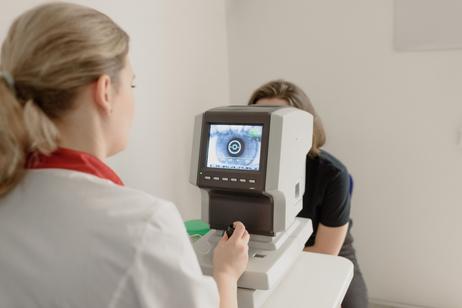Health insurance is notoriously expensive in the United States, and as Americans struggle to maintain their basic health insurance coverage, many have eliminated their vision and dental insurance policies. However, proper eye care is an essential part of overall health. A person who does not have the proper eyeglasses can suffer from a severely compromised quality of life.
Fortunately, several community colleges with optometry training programs are beginning to offer free clinics, training for community college students, and free or low-cost services to residents in need.
Free Services Benefit Local Residents on a Budget
Ophthalmic technician Joy Fountain, who organizes a Community Eyecare Day along with Michigan eye care chain Advanced Eyecare Professionals, tells the Grand Rapids Press that seeing people in need who are helped by the free clinic days makes all the planning and extra effort worth it. She tells the story of one woman who came to the clinic wearing her son’s taped-together glasses, even though her son’s glasses were for a nearsighted person while the woman was farsighted.
Another woman, whose free exam revealed that she had glaucoma and who was able to receive corrective laser surgery from the clinic, tells the Grand Rapids Press that if it weren’t for the volunteers at the Community Eyecare Day, “I wouldn’t have glasses, and I probably would have lost my eyesight.”
This video offers a look at the Opthamalic Assistant training program at College of DuPage.
The American Optometric Association says regular vision exams are essential to preventative health care. Because, as the AOA notes, “many eye and vision problems have no obvious signs or symptoms,” people who do not get their vision checked regularly may be unaware that a problem is developing and thus may miss the opportunity to treat problems early before irreparable damage and possible vision loss occur.
According to WebMD, adults with vision problems such as nearsightedness or farsightedness should get eye exams every two years before age 50 and every year after age 50. The American Diabetic Association recommends a yearly eye exam for people with diabetes, whether or not they have been diagnosed with vision problems.
Working in Free Clinics Helps Community College Students Too
While residents can benefit from the free clinics, these eye care clinics also provide students with excellent training opportunities.
Students Gain Hands-On Experience
Middlesex Community College’s Ophthalmic Design and Dispensing program recently held its annual Community Eyecare Day, wherein 40 residents from the surrounding community could get eye exams and new glasses that local businesses had donated.
Joyce Furman, a second-year Ophthalmic Design and Dispensing program student and one of the event’s co-coordinators, tells the Hartford-Courant that community college students benefit from the opportunity to practice their skills in their courses in a real-world setting. "Contact with the patients is the biggest thing,” she says. “It's the hands-on experience that we need.”
This video overviews Howard Community College’s Ophthalmic Technician Assistant Training.
Chance to Give Back to the Community
Professor Rene "Skip" Rivard of Middlesex Community College’s OD&D department tells the Hartford-Courant that he sees the event as an important way to teach students the value of using their skills and training to give back to their community. "This project provides an opportunity for our students to understand that being a health care provider is not strictly for pecuniary benefits," he says. “The students recognize the need to use their education to provide a service within their community.”
Helps Student Prepare for the Job Hunt
Volunteering in free clinics can also benefit community college students by giving them an edge over the competition when they finish training and seek a job. The Free Clinic of Southwest Washington, which depends on volunteers to provide a range of free health, vision, and dental services to residents, notes that people who have received training in a medical profession may “find it difficult to break into the real job market without major experience.” Working at the free clinic helps students trained in the Ophthalmic Tech program at the nearby Portland Community College gain real-world experience to find a real-world job. Through community colleges, both residents and students see clearly!
The availability of free eye care clinics at community colleges can vary depending on the location and resources of the college. Some community colleges may have partnerships with local health clinics or optometry schools to provide free eye care services to students and the community, while others may not have such partnerships.It may be helpful to contact the health services or student affairs office at a specific community college to inquire about the availability of free eye care clinics on campus or nearby. Additionally, organizations such as the Lions Club and Prevent Blindness may offer free eye care services and resources in certain communities.
Questions? Contact us on Facebook. @communitycollegereview












